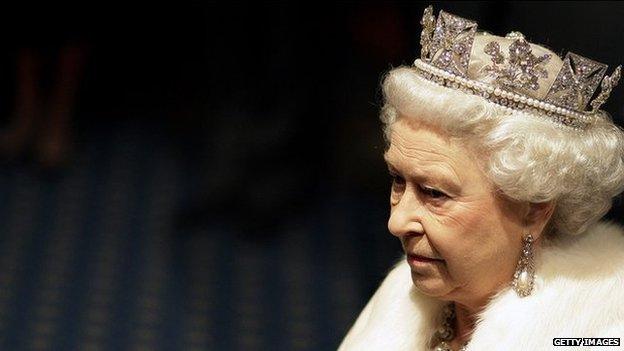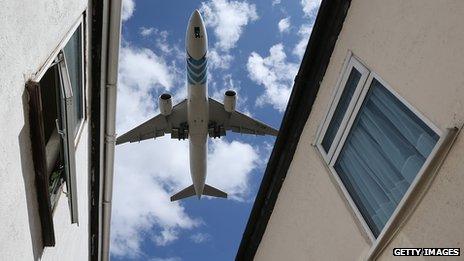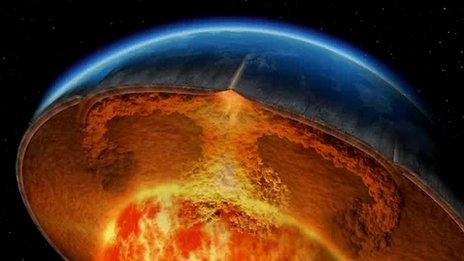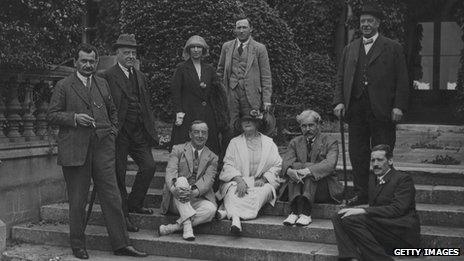Location, salvation, damnation
- Published

If you strike oil in your back garden don't give up the day job - because it belongs to the Queen. How did that happen?
It used to be so simple: if you owned a piece of land you also owned everything above and beneath it, from heaven to hell [Cuius est solum, eius est usque ad coelum et ad inferos].
A legal maxim of dubious Roman heritage, this made its debut in English common law in 1587, in a case enabling a property developer who owned land extending to the boundary of his neighbour's house to build upwards, even though this meant blocking a window through which his neighbour had enjoyed natural light for 30 years.
Even today, a vertical column, centred on each plot of land with sides matching its boundaries, extending indefinitely into outer space and down through the Earth's crust, is the 3D vision of land ownership that prevails in legal discourse, if only to highlight its absurdity.
One obvious drawback of the model, underlined by Court of Appeal judge Lord Justice Aikens, is that, towards the centre of the Earth, all landowners would have "a lot of neighbours".
After detailed consideration, external, former deputy president of the Supreme Court Lord Hope said in 2010 that the "simple notion" of such a column was "plainly no longer tenable".
He cited a smattering of litigious US landowners who in 1946 found themselves powerless to prevent aircraft flying low over their farms, even though they claimed many of their chickens had been frightened by the noise so terribly that they clattered into the sides of their hutches and died of their injuries.
Unmoved by the poultry's plight, US Supreme Court Justice Douglas ruled: "The air is a public highway... Were that not true, every transcontinental flight would subject the operator to countless trespass suits. Common sense revolts at the idea."

How vertical visions of land ownership have evolved

Before the twentieth century it was assumed a land owner's rights extended from the centre of the earth to the top of the sky. But a series of key court cases have challenged that notion.
1931: US court rules that a sewer 150ft deep was not on land belonging to the home owner above.
1946: US Supreme court rules that transcontinental flights do not trespass on land below.
1978: High Court of England and Wales says aerial photography plane was not trespassing.
2010: UK Supreme Court rules that diagonal drilling down to 2,800ft from an adjacent plot of land is still trespassing under the surface.

Closer to home, in 1978 the High Court of England and Wales ruled that an aerial photography firm had not trespassed on then Granada TV chairman Baron Bernstein's property by taking a picture of it from above.
But the court also accepted the principle that a lower-altitude incursion, at a height which might have constituted more of an interference to the baron's use of his land, would have amounted to trespass.
Lord Hope had been weighing up the merits of a 2010 case in which a company owned by former Harrods boss Mohamed al-Fayed complained that an oil firm had drilled diagonally from an adjacent plot through the land beneath its grand Surrey mansion, without obtaining its consent.

In this property, or merely above it?
The Supreme Court was asked to decide whether the drilling had taken place at a depth that, like aeroplanes soaring overhead, could be exempted from the old heaven-and-hell maxim.
Anything drilled down to 8.7 miles (14km) would be crushed by the Earth's pressure and vaporised by a temperatures in excess of 500C, Lord Hope observed.
"There must obviously be some stopping point, as one reaches the point at which physical features such as pressure and temperature render the concept of the strata belonging to anybody so absurd as to be not worth arguing about," Lord Hope said in his judgement.
But the drilling in this case had taken place at depths of between 800 and 2,800 feet below the land belonging to Mr al-Fayed's company, Bocardo, and the court therefore ruled that the oil firm had indeed trespassed.
So was Bocardo company entitled to a share of the £10m or so in spoils, as it had demanded?

The Earth's radius is about 3,959 miles (6,371km)
No. Instead it received just £1,000 in compensation for the trespass, which one of the judges described as "positively generous" since the oil firm had not affected Bocardo's "use or enjoyment of its land one iota".
Crucially for Mr al-Fayed, ownership of all petrol and natural gas lying anywhere underground in the UK was "vested in His Majesty" by the Petroleum (Production) Act 1934, by the Conservative-dominated national coalition led by ex-Labour PM Ramsey Macdonald.
The government was to grant licences on the Crown's behalf to companies wishing to exploit the resources on a case-by-case basis, with licence-holders entitled to compulsory access powers if they cannot negotiate with the owners of land they needed to use to get at the petroleum.

Ramsay McDonald (centre-right) oversaw the nationalisation of the UK's onshore oil and gas reserves
At the time, this approach was likened to Stalinism in the House of Lords.
"The Russian government have seized all minerals and everything else," remarked one peer. "That is what this bill proposes as regards natural oil."
But the legislation's advocates were unconvinced.
Efforts to find oil in the UK under the previous legal regime had been "spasmodic, under-capitalised and inefficient", said Conservative Secretary of State for Air the Marquess of Londonderry, who was in charge of steering the bill through the upper House.
"Petroleum, being a fluid, is different from other minerals," he explained. It was deemed impossible to tell, were large amounts of oil to be found in this patchwork nation of comparatively small estates, how much of it had been drawn from under whose properties, and who therefore should be entitled to what extent of royalties.
Fearing "endless litigation" and keen for the UK to "make the most of any oil which may be proved to exist... in the most economical way", the marquess concluded that nationalisation - with no compensation or royalties paid to landowners who might in future find themselves sitting on vast riches - offered "the only practicable solution".
Parliamentarians took a dim view of the legal position in the US, where property owners were, and still are, entitled to royalty payments when oil and gas is extracted from beneath their land.
The president of the board of trade Walter Runciman, later Viscount Runciman of Doxford, told the Commons that this had resulted in "uncontrolled development" of US oil fields and 13-year irresolvable legal battles over royalty payments.
Nationalisation was "far wiser and far more foresighted", he continued, imploring MPs: "Do not let us repeat here the errors made in the United States of America."
Oil and gas thus joined the short list of minerals owned by the Crown, which then comprised just gold and silver. Coal reserves have since been nationalised too.
"The nation generally will benefit by the royalties to be paid to the Exchequer," declared the Marquess of Londonderry, who foresaw that "the landscape will not be disfigured needlessly", as it had in the US.
But 80 years later, the extent of the current coalition's efforts to win popular support for "fracking" show that not everybody is persuaded.